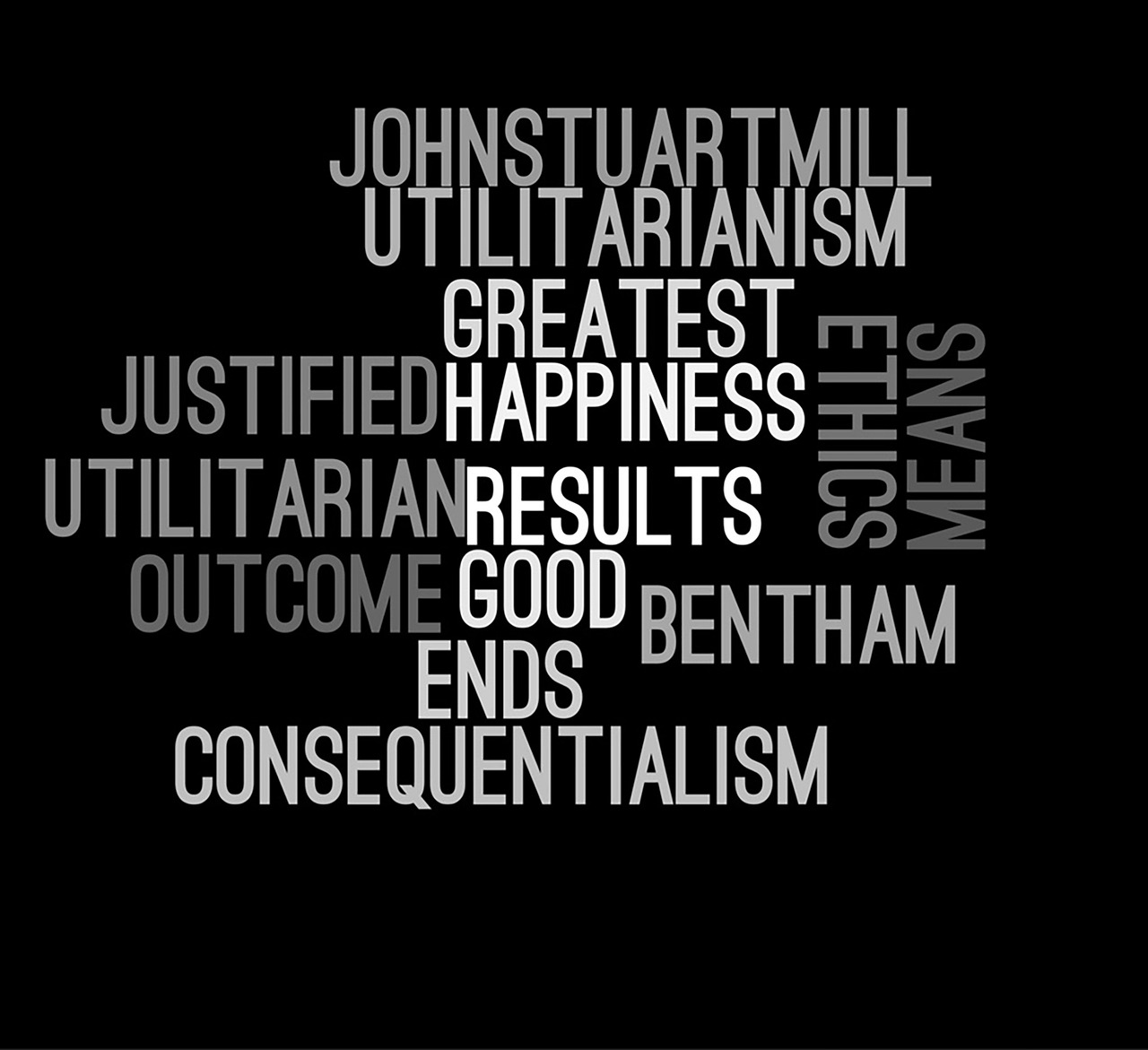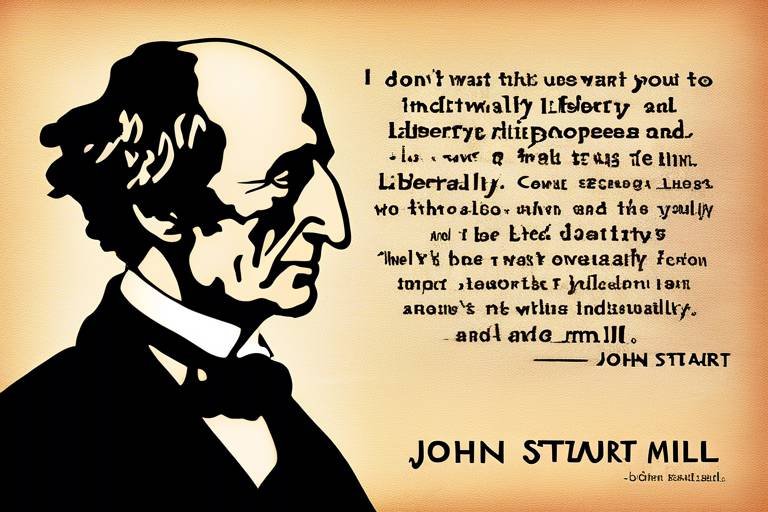John Stuart Mill's Thoughts on Utilitarianism
Utilitarianism, a philosophy that champions the idea of maximizing happiness for the greatest number, finds its most compelling advocate in John Stuart Mill. His contributions to this ethical framework are not just theoretical musings; they resonate deeply with our everyday moral dilemmas. Imagine walking through a bustling city, where every choice you make could either uplift or diminish the collective joy of those around you. This is the essence of Mill's utilitarianism, a lens through which we can examine our actions and their consequences. Mill's thoughts push us to ask: Are we doing enough to ensure that our decisions lead to the greatest happiness?
At the heart of Mill's philosophy lies the greatest happiness principle, which posits that the rightness or wrongness of actions is determined by their outcomes, specifically their ability to produce happiness. This principle is not just a cold calculation of pleasure versus pain; it is a profound call to consider the broader implications of our actions on society. Mill argues that true happiness is not merely about the quantity of pleasure but also the quality. In this way, his approach transcends the simplistic hedonism that often accompanies discussions of utilitarianism.
Mill's thoughts provide a rich tapestry of ideas that challenge us to think critically about ethics. He invites us to reflect on the impact of our decisions and encourages a dialogue about morality that is both personal and societal. His insights remain relevant today, as we navigate complex issues ranging from environmental ethics to social justice. So, what can we learn from Mill? How can his thoughts on utilitarianism guide us in making ethical choices that benefit not only ourselves but also our communities?
In exploring Mill’s contributions, we can see that he was not merely concerned with abstract principles. Instead, he was deeply invested in the practical implications of his philosophy. He believed that our moral choices should strive to enhance overall happiness while respecting individual rights. This balancing act is what makes Mill's utilitarianism both compelling and challenging. It urges us to consider not just our immediate needs but also the long-term effects of our actions on the world around us.

The Foundation of Utilitarianism
To truly understand utilitarianism, one must first delve into its foundational principles. At its core, utilitarianism is centered around the idea that the moral worth of an action is determined by its outcome, specifically in terms of the happiness it produces. This is often encapsulated in the phrase known as the greatest happiness principle, which posits that actions are right if they promote happiness and wrong if they produce the opposite. Imagine a scale where happiness is weighed against suffering; utilitarianism aims to tip that scale in favor of joy, not just for one individual, but for the greatest number of people possible.
Historically, utilitarianism emerged as a response to the rigid moral codes that dominated philosophical thought. Think of it as a breath of fresh air—a way to evaluate actions based on their real-world consequences rather than abstract rules. This pragmatic approach appealed to many, as it acknowledged the complexities of human experience and the varying contexts in which decisions are made. Mill, in particular, emphasized that understanding the outcomes of our actions is crucial for ethical decision-making. His philosophical framework encourages individuals to look beyond their own desires and consider the broader impact of their choices on society.
One of the most significant aspects of utilitarianism is its focus on outcomes. Unlike deontological ethics, which adhere to strict rules regardless of the consequences, utilitarianism invites us to assess the results of our actions. This can be likened to a chess game: every move you make has implications not just for your own position, but for the entire board. Similarly, in life, the choices we make can have ripple effects that extend far beyond our immediate surroundings. Thus, utilitarianism encourages a more holistic view of ethics, urging us to consider how our actions contribute to the overall well-being of others.
However, this focus on outcomes raises important questions: What constitutes happiness? How do we measure it? Mill argued that happiness is not just about pleasure; it encompasses a broader spectrum of human experiences, including intellectual and emotional fulfillment. This nuanced understanding is critical for applying utilitarian principles in real-world scenarios. For instance, when evaluating a policy decision, one must consider not only the immediate benefits but also the long-term effects on societal happiness. In this way, utilitarianism serves as a dynamic ethical framework that adapts to the complexities of human life.
In summary, the foundation of utilitarianism lies in its commitment to maximizing happiness through thoughtful consideration of the consequences of our actions. This approach not only challenges traditional moral frameworks but also invites us to engage with the world in a more meaningful way. By prioritizing the greatest happiness for the greatest number, utilitarianism encourages a collective responsibility towards ethical decision-making, making it a vital philosophy in both historical and contemporary contexts.

Mill's Distinction Between Higher and Lower Pleasures
John Stuart Mill's exploration of utilitarianism takes a fascinating turn when he introduces the concept of higher and lower pleasures. This distinction is pivotal in understanding his ethical framework. While traditional utilitarianism might suggest that all pleasures are equal, Mill boldly asserts that not all pleasures hold the same value. He argues that pleasures derived from intellectual pursuits, moral integrity, and aesthetic appreciation are fundamentally superior to those that are merely physical. Imagine two people enjoying a meal: one is indulging in a sumptuous feast, while the other is engrossed in a thought-provoking book. Mill would argue that the pleasure derived from the book is of a higher quality, contributing to a more profound sense of happiness.
To illustrate this distinction, Mill categorizes pleasures into two groups:
- Higher Pleasures: These include intellectual and moral pleasures, such as the joy of learning, the satisfaction of doing good, and the appreciation of art and beauty. They enrich the mind and spirit, leading to a more fulfilling life.
- Lower Pleasures: These are primarily physical and sensory in nature, such as eating, drinking, or engaging in physical activities. While enjoyable, they do not contribute to the same depth of happiness as higher pleasures.
This hierarchy of pleasures is crucial because it allows for a more nuanced approach to ethical decision-making. Mill contends that individuals who have experienced both types of pleasures are best equipped to judge their value. He famously states, “It is better to be a human being dissatisfied than a pig satisfied; better to be Socrates dissatisfied than a fool satisfied.” This quote encapsulates his belief that the quality of pleasure matters significantly in the pursuit of the greatest happiness.
Moreover, Mill’s distinction has significant implications for how we evaluate actions and their consequences. If one accepts that higher pleasures are more valuable, then it follows that actions promoting these pleasures should be prioritized in ethical considerations. For instance, a society that invests in education, the arts, and cultural enrichment is likely to foster a greater overall happiness than one that focuses solely on satisfying immediate physical desires.
However, this distinction is not without its challenges. Critics argue that Mill's categorization introduces a level of subjectivity that can complicate ethical decision-making. How do we measure the quality of a pleasure? Who gets to decide what constitutes a higher pleasure? These questions highlight the complexities of applying Mill's ideas in real-world situations. Nevertheless, the framework he provides encourages us to think critically about the types of happiness we pursue and the values we uphold in our lives.
Q: What are higher and lower pleasures according to Mill?
A: Higher pleasures are those that engage the intellect and moral sensibilities, such as learning and artistic appreciation, while lower pleasures are mainly physical and sensory, like eating and drinking.
Q: Why does Mill believe higher pleasures are more valuable?
A: Mill argues that higher pleasures contribute to a deeper sense of fulfillment and happiness, enhancing the quality of life beyond mere physical satisfaction.
Q: How does Mill's distinction affect ethical decision-making?
A: It encourages individuals to prioritize actions that promote higher pleasures, fostering a more enriching and sustainable form of happiness in society.

The Role of Competent Judges
In the realm of utilitarianism, John Stuart Mill introduces a fascinating concept known as competent judges. But who exactly are these judges, and why are they so crucial to Mill's ethical framework? Essentially, competent judges are individuals who possess the experience and knowledge necessary to discern the qualitative differences between various pleasures. Think of them as the connoisseurs of happiness, those who can appreciate the subtle nuances that separate a fleeting moment of joy from a profound sense of fulfillment.
Mill argues that the opinions of these competent judges are not just valuable; they are essential in determining what constitutes the greatest happiness. Imagine attending a fine art exhibition. While anyone can appreciate a painting, only those with a trained eye—critics, artists, or art historians—can truly grasp the depth and intricacies of the work. Similarly, competent judges in Mill's philosophy serve as a guiding light, illuminating the path to ethical decision-making by evaluating the quality of pleasures rather than merely their quantity.
But what criteria do these judges use to assess pleasures? Competent judges rely on a few key factors:
- Experience: They have engaged with various forms of pleasure, allowing them to draw comparisons and understand the implications of their choices.
- Knowledge: They possess insights into moral and intellectual pleasures that transcend mere physical enjoyment.
- Empathy: Their ability to consider the feelings and perspectives of others plays a significant role in their assessments.
However, this reliance on competent judges raises some intriguing questions. For instance, how do we ensure that these judges are truly impartial and not swayed by personal biases? What happens when their opinions diverge, leading to conflicting assessments of what constitutes the greatest happiness? These challenges highlight the inherent subjectivity in ethical decision-making within utilitarianism. After all, while one person's idea of happiness might involve intellectual pursuits, another might find joy in physical pleasures. This divergence can complicate the application of Mill's principles in real-world scenarios.
Ultimately, the role of competent judges in Mill's utilitarianism is both enlightening and challenging. They provide a framework for evaluating pleasures that goes beyond mere numbers and statistics, emphasizing the importance of quality in our pursuit of happiness. Yet, as we navigate the complexities of moral decisions, we must remain vigilant about the potential pitfalls of relying too heavily on subjective judgments. In a world where the quest for happiness is often fraught with contradictions, the insights of competent judges offer a valuable perspective, guiding us toward a more nuanced understanding of ethics and morality.
- What are competent judges in utilitarianism? Competent judges are individuals with the experience and knowledge to evaluate the quality of pleasures, crucial for determining what constitutes the greatest happiness.
- Why are their opinions important? Their insights help discern the qualitative differences between pleasures, guiding ethical decision-making beyond mere quantitative measures.
- What challenges arise from relying on competent judges? Issues of subjectivity, personal biases, and conflicting opinions can complicate the application of utilitarian principles.

Criteria for Competence
When we delve into the concept of competent judges in John Stuart Mill's framework of utilitarianism, it becomes clear that not just anyone can fill this role. Mill emphasizes that these judges must possess certain criteria that enable them to make informed and nuanced assessments about the quality of pleasures. So, what exactly are these criteria? Let's break it down.
First and foremost, experience plays a crucial role. Competent judges are individuals who have engaged with various forms of pleasure and can compare them effectively. This experience allows them to appreciate the subtleties that differentiate a fleeting moment of joy from a profound sense of fulfillment. Imagine trying to judge a fine wine without ever having tasted it; you simply wouldn't have the palate to discern its complexities. Similarly, a competent judge must have a rich tapestry of experiences to draw from.
Next, we have knowledge. It’s not enough to merely experience pleasures; one must also understand them. This knowledge can come from various sources: philosophical teachings, psychological insights, or even cultural contexts. For instance, a person who has studied ethics or has a background in psychology will likely have a more profound understanding of human happiness and suffering. They can assess not just the immediate effects of a pleasure but also its long-term implications on well-being.
Moreover, competent judges should exhibit empathy. This emotional intelligence allows them to consider the perspectives of others, making their assessments more holistic. They can appreciate how a particular pleasure affects not just themselves but also the larger community. In a way, they act as a bridge between individual experiences and collective happiness, ensuring that their evaluations promote the greatest good for the greatest number.
To summarize, the criteria for competence in Mill's utilitarianism can be encapsulated in the following points:
- Experience: A rich history of engaging with various pleasures.
- Knowledge: A deep understanding of ethical principles and human psychology.
- Empathy: The ability to consider the feelings and perspectives of others.
These criteria not only elevate the role of competent judges but also pose interesting questions about who gets to decide what constitutes quality in pleasure. Are there universal standards, or do they vary across cultures and contexts? The reliance on such judges introduces a layer of complexity into ethical decision-making within the realm of utilitarianism, challenging us to consider how subjective experiences can shape our collective moral compass.
- What is utilitarianism? Utilitarianism is an ethical theory that suggests the best action is the one that maximizes happiness for the greatest number of people.
- Who was John Stuart Mill? John Stuart Mill was a 19th-century British philosopher and political economist, known for his contributions to utilitarianism and liberal thought.
- What are competent judges in utilitarianism? Competent judges are individuals with the experience, knowledge, and empathy needed to assess and compare the quality of pleasures.
- Why is the distinction between higher and lower pleasures important? This distinction helps to prioritize more meaningful and fulfilling experiences over mere physical or immediate pleasures, influencing ethical evaluations.

Implications for Moral Decisions
When we dive into the implications of Mill's concept of competent judges, it becomes clear that the moral landscape is anything but straightforward. Imagine you're at a crossroads, and each path represents a different ethical decision. The idea of relying on competent judges introduces a fascinating yet complex dynamic to how we make these choices. Who gets to decide what is right or wrong? This question looms large, especially when we consider that moral decisions often involve competing interests and values.
Mill suggests that competent judges, those who have experienced both higher and lower pleasures, can guide us in determining what truly contributes to the greatest happiness. However, this reliance on a select few raises critical questions about subjectivity and authority. For instance, if a group of judges believes that a particular action will yield the greatest happiness, but it comes at the expense of a minority's rights, are they truly acting in the best interest of society? This tension illustrates the potential for ethical dilemmas where the majority's happiness could infringe upon the rights of the few.
Furthermore, we must consider the criteria for being a competent judge. Mill emphasizes that these individuals should possess significant experience and knowledge about the pleasures in question. But how do we quantify or assess this competence? Is it through formal education, personal experience, or perhaps a combination of both? The ambiguity surrounding these criteria can lead to inconsistencies in moral decision-making, as different judges might prioritize different aspects of happiness based on their unique perspectives.
In practical terms, the implications for moral decisions can be profound. For example, in public policy, if a panel of judges decides to implement a policy that maximizes societal happiness but overlooks its impact on a vulnerable group, we find ourselves in a moral quagmire. The challenge lies in balancing the collective good with the rights of individuals. This is where Mill's utilitarianism can be both enlightening and troubling. It encourages us to think critically about the consequences of our actions but also reminds us of the ethical responsibilities we hold toward one another.
To illustrate these complexities, consider the following table that summarizes the potential conflicts arising from relying on competent judges in moral decision-making:
| Aspect | Potential Conflict |
|---|---|
| Majority vs. Minority Rights | The happiness of the majority could lead to the oppression of minority groups. |
| Subjectivity of Pleasure | Different judges may have varying opinions on what constitutes a higher pleasure. |
| Criteria for Competence | Challenges in defining and assessing who qualifies as a competent judge. |
Ultimately, the implications of Mill's thoughts on moral decisions compel us to reflect on our ethical frameworks. They push us to ask tough questions and confront the realities of our choices. Are we truly considering the greater good, or are we allowing biases and subjective opinions to cloud our judgment? As we navigate this intricate web of moral decision-making, Mill's insights serve as a vital reminder of the importance of empathy, understanding, and a commitment to justice in our pursuit of happiness.
- What is utilitarianism? Utilitarianism is an ethical theory that suggests the best action is the one that maximizes overall happiness or utility.
- Who is John Stuart Mill? John Stuart Mill was a 19th-century philosopher and political economist known for his contributions to utilitarianism and liberal thought.
- What are higher and lower pleasures? Higher pleasures are intellectual and moral pursuits, while lower pleasures are more physical and sensory in nature.
- What role do competent judges play in utilitarianism? Competent judges help assess the quality of pleasures and guide ethical decision-making based on their experiences and knowledge.
- How does utilitarianism relate to justice? Utilitarianism seeks to balance the pursuit of happiness with the protection of individual rights, raising important questions about fairness and equity.

Critiques of Utilitarianism
Utilitarianism, while a robust ethical framework, has faced its fair share of critiques that question its validity and applicability in real-world scenarios. One of the primary concerns is the potential for **injustice** inherent in a system that prioritizes the greatest happiness for the greatest number. Critics argue that this can lead to situations where the rights of individuals are overlooked or even trampled in favor of the majority's desires. For instance, if a society decides that executing an innocent person would bring happiness to a larger group, utilitarianism could theoretically justify such an act. This raises a critical question: can the end truly justify the means?
Moreover, the **tyranny of the majority** is a significant concern. This concept suggests that the majority's happiness can often come at the expense of minority groups, leading to systemic oppression. In a society where utilitarian principles are strictly followed, minority voices may be silenced, as their needs and rights could be sacrificed for the sake of collective happiness. This creates a moral dilemma: how do we ensure that the happiness of the few is not continually overshadowed by the happiness of the many?
Another critique revolves around the **measurement of happiness** itself. How do we quantify happiness? Is it fair to compare the joy derived from a simple pleasure, like a delicious meal, with the satisfaction gained from achieving a lifelong dream? Mill's framework suggests that we can distinguish between higher and lower pleasures, but this subjective assessment can lead to inconsistencies. Critics argue that such distinctions are often based on personal biases, making it difficult to apply utilitarianism uniformly across different contexts.
Additionally, utilitarianism can sometimes lead to **short-term thinking**. When decisions are made solely on the basis of immediate outcomes, the long-term consequences may be overlooked. For example, a policy that provides immediate relief to a large population might inadvertently cause harm to future generations. This raises another important question: should we prioritize immediate happiness over future well-being?
In light of these critiques, it is essential to consider alternative ethical frameworks that might address the shortcomings of utilitarianism. For instance, **deontological ethics** emphasizes the importance of rules and duties, placing individual rights at the forefront. This approach provides a counterbalance to utilitarianism by ensuring that individual liberties are respected, even if it means sacrificing some degree of collective happiness.
Despite these critiques, utilitarianism remains a significant force in ethical discussions today. It challenges us to think critically about the consequences of our actions and the broader impacts on society. By grappling with these critiques, we can refine our understanding of utilitarianism and its role in shaping moral philosophy.
- What is utilitarianism? Utilitarianism is an ethical theory that suggests the best action is the one that maximizes overall happiness or utility.
- Who is John Stuart Mill? John Stuart Mill was a 19th-century philosopher and political economist who contributed significantly to the development of utilitarianism.
- What are the main critiques of utilitarianism? Critiques include concerns about justice, individual rights, the tyranny of the majority, measurement of happiness, and short-term thinking.
- How does Mill differentiate between pleasures? Mill distinguishes between higher pleasures (intellectual and moral) and lower pleasures (physical), arguing that the former are superior.
- Is utilitarianism still relevant today? Yes, utilitarianism continues to influence contemporary ethical discussions, particularly in public policy and social justice.

Utilitarianism and Justice
When we dive into the intricate relationship between utilitarianism and justice, we uncover a fascinating web of ethical considerations. At first glance, it may seem that utilitarianism, with its focus on the greatest happiness for the greatest number, could potentially overlook the rights of individuals. After all, if the majority benefits from a certain action, what happens to the rights and well-being of the minority? This question is at the heart of the tension between these two concepts. Mill, however, provides a nuanced perspective that attempts to bridge this gap.
Mill argues that true justice is not merely about adhering to rigid rules or societal norms; rather, it is about ensuring that individual rights are protected in a way that ultimately contributes to the greater good. He posits that safeguarding these rights enhances overall happiness, suggesting that justice is an integral component of utilitarianism. In other words, a society that respects individual rights is more likely to achieve a higher level of collective happiness.
To illustrate this point, consider a scenario where a community decides to build a new highway that would significantly reduce travel time for the majority. However, this construction would displace a small number of families. A strict utilitarian approach might endorse the highway's construction based solely on the greater benefit to the majority. But Mill would urge us to consider the implications for the displaced families. By protecting their rights and ensuring they are treated fairly, the community may foster a sense of trust and social cohesion, ultimately leading to greater happiness for all.
In exploring this relationship, it becomes evident that justice and utilitarianism are not mutually exclusive. Instead, they can complement one another. Mill’s approach encourages us to think critically about how we define happiness and justice. He invites us to ask questions such as:
- How can we ensure that our pursuit of happiness does not infringe upon the rights of others?
- What mechanisms can we put in place to protect minority interests while still striving for the greater good?
Furthermore, Mill’s emphasis on the importance of competent judges plays a crucial role in this discussion. These judges, equipped with the knowledge and experience to assess the qualitative aspects of pleasure and pain, can help navigate the complex waters of ethical decision-making. Their insights can guide us in making choices that uphold justice while maximizing happiness.
However, it’s essential to recognize that the interplay between utilitarianism and justice is not without its challenges. Critics argue that relying on the majority's happiness can lead to a form of tyranny, where the needs of the few are sacrificed for the many. This concern raises significant questions about how we can apply utilitarian principles without compromising our commitment to justice.
In conclusion, while the relationship between utilitarianism and justice may be fraught with tension, Mill's philosophy offers a pathway toward reconciliation. By recognizing that justice is not only compatible with utilitarianism but also essential for achieving true happiness, we open the door to a more equitable and just society. This understanding encourages us to continually reflect on our ethical frameworks and strive for a balance that honors both individual rights and the collective good.
- What is the main conflict between utilitarianism and justice? The main conflict arises from the potential for utilitarianism to prioritize the happiness of the majority over the rights of individuals, which can lead to unjust outcomes.
- How does Mill reconcile utilitarianism with justice? Mill argues that protecting individual rights contributes to the overall happiness of society, suggesting that justice is a vital component of utilitarianism.
- Can utilitarianism support minority rights? Yes, according to Mill, safeguarding minority rights can enhance social cohesion and contribute to greater happiness for all members of society.

Mill's Response to Justice Concerns
John Stuart Mill recognized that the relationship between utilitarianism and justice is complex and often contentious. Critics often argue that a strict utilitarian approach might allow for the infringement of individual rights in favor of the greater good. However, Mill was not one to shy away from these challenges. He asserted that justice is not merely a set of rules but rather a fundamental component of human happiness. In his view, justice and utilitarianism are intertwined, as safeguarding individual rights ultimately contributes to the overall happiness of society.
Mill argued that true justice involves the protection of individual rights, which he believed were essential for the flourishing of individuals and, by extension, society as a whole. He posited that when individuals feel secure in their rights, they are more likely to contribute positively to the collective happiness. Thus, he contended that the pursuit of happiness should not come at the expense of justice; rather, the two should work in harmony to create a more equitable society.
To illustrate his point, Mill proposed that the violation of individual rights, even in the name of greater happiness, could lead to societal unrest and ultimately diminish the overall well-being of the community. He emphasized that a society built on justice would be more stable and harmonious, as individuals would trust that their rights were respected. This trust, in turn, fosters social cooperation and enhances collective happiness.
Moreover, Mill believed that justice is rooted in the principle of utility itself. He argued that protecting individual rights aligns with the greatest happiness principle, as it promotes a society where individuals can thrive without fear of oppression. In this way, Mill’s response to justice concerns highlights the importance of balancing individual rights with the collective good, ensuring that neither is sacrificed for the other.
In summary, Mill's response to justice concerns reinforces the idea that a just society is one where individual rights are upheld. By integrating justice into the fabric of utilitarianism, Mill provided a framework that seeks to harmonize personal freedoms with the pursuit of the greater good, ultimately enhancing the overall happiness of society.
- What is the main idea behind Mill's utilitarianism? Mill's utilitarianism emphasizes the greatest happiness principle, where actions are judged based on their outcomes in promoting overall happiness.
- How does Mill differentiate between higher and lower pleasures? Mill argues that intellectual and moral pleasures are superior to mere physical pleasures, influencing ethical evaluations.
- What role do competent judges play in Mill's philosophy? Competent judges are individuals who can discern the quality of pleasures and their opinions are crucial in determining what constitutes the greatest happiness.
- How does Mill address concerns about justice in utilitarianism? Mill integrates justice into utilitarianism by asserting that safeguarding individual rights contributes to the greater good and overall happiness.

Modern Applications of Mill's Ideas
John Stuart Mill's ideas on utilitarianism are not just dusty philosophical concepts confined to the pages of history; they resonate profoundly in today's world. In fact, his principles serve as a guiding light in various fields such as public policy, economics, and social justice. Imagine a world where decisions are made not just on the basis of legal frameworks but also on the potential to maximize happiness and minimize suffering. This is where Mill's utilitarianism comes into play, serving as a practical tool for evaluating the consequences of actions in a contemporary context.
For instance, in public policy, lawmakers often grapple with complex decisions that can impact millions. Mill’s greatest happiness principle encourages policymakers to consider the broader implications of their choices, ensuring that the outcomes benefit the majority while safeguarding minority rights. This balancing act is crucial in democratic societies where the needs of diverse populations must be met. By applying Mill's framework, policymakers can prioritize initiatives that enhance collective welfare, such as healthcare reforms, education policies, and social safety nets.
Moreover, Mill's thoughts have also permeated the realm of economics. The idea of maximizing utility is a cornerstone of economic theory, guiding everything from consumer behavior to market regulations. Economists often use utilitarian principles to assess the efficiency of resource allocation, arguing that the best economic policies are those that lead to the greatest overall happiness. This approach has led to a focus on welfare economics, where the aim is to evaluate social welfare in terms of individual utility, reflecting Mill's core beliefs.
In the context of social justice, Mill’s philosophy remains highly relevant. Issues such as inequality, discrimination, and environmental justice can be examined through a utilitarian lens. Advocates for social change often argue that policies should aim to reduce suffering and promote happiness for marginalized groups. Mill's emphasis on the quality of pleasures encourages activists to consider not just the quantity of happiness generated but also the ethical implications of social policies. This approach fosters a more inclusive dialogue about what constitutes true happiness and well-being in society.
To illustrate the modern applications of Mill's ideas, consider the following table that highlights key areas influenced by his philosophy:
| Field | Application of Mill's Ideas |
|---|---|
| Public Policy | Evaluating laws and regulations based on their impact on collective happiness. |
| Economics | Utilizing principles of utility maximization in resource allocation and market policies. |
| Social Justice | Addressing inequalities and promoting policies that enhance the well-being of marginalized communities. |
In conclusion, Mill's utilitarianism offers a comprehensive framework for navigating the complexities of modern society. By focusing on the outcomes of actions and striving for the greatest happiness, we can foster a more ethical and just world. His insights remind us that while we may face challenging moral dilemmas, the ultimate goal should always be to enhance the well-being of individuals and communities alike.
- What is utilitarianism? Utilitarianism is an ethical theory that suggests that the best action is the one that maximizes utility, typically defined as that which produces the greatest happiness for the greatest number of people.
- How does Mill's utilitarianism differ from earlier forms? Mill's version emphasizes the quality of pleasures, distinguishing between higher intellectual pleasures and lower physical ones, which was a significant advancement over earlier utilitarian thought.
- Can utilitarianism be applied in everyday decision-making? Yes, utilitarian principles can guide personal and professional decisions by encouraging individuals to consider the consequences of their actions on overall happiness.
- What are some criticisms of utilitarianism? Critics argue that utilitarianism can overlook individual rights, lead to unjust outcomes, and create a "tyranny of the majority" where the happiness of the few is sacrificed for the many.
Frequently Asked Questions
- What is utilitarianism?
Utilitarianism is an ethical theory that suggests actions are right if they promote happiness or pleasure and wrong if they produce unhappiness or pain. It's all about maximizing overall well-being, often summarized by the phrase "the greatest happiness for the greatest number."
- Who was John Stuart Mill?
John Stuart Mill was a 19th-century British philosopher and political economist, best known for his contributions to utilitarianism. He expanded on the ideas of his predecessor, Jeremy Bentham, and introduced significant nuances, particularly regarding the quality of pleasures.
- What are the key principles of Mill's utilitarianism?
Mill's utilitarianism centers on the greatest happiness principle, which emphasizes outcomes over intentions. He also distinguishes between higher (intellectual and moral) and lower (physical) pleasures, arguing that the former are more valuable for human flourishing.
- What are "competent judges" in Mill's framework?
Competent judges are individuals who possess the experience and knowledge necessary to discern the quality of pleasures. According to Mill, their opinions are vital in determining what actions lead to the greatest happiness, as they can evaluate the nuances of different types of pleasures.
- How does Mill address the critiques of utilitarianism?
Mill acknowledges critiques regarding justice and individual rights, arguing that true justice is integral to utilitarianism. He posits that protecting individual rights ultimately enhances overall happiness, thus reconciling the pursuit of the greater good with respect for personal freedoms.
- What are some modern applications of Mill's ideas?
Mill's utilitarian principles continue to inform contemporary discussions in various fields, including public policy, economics, and social justice. His emphasis on the balance between individual rights and collective happiness remains relevant in addressing ethical dilemmas today.



















